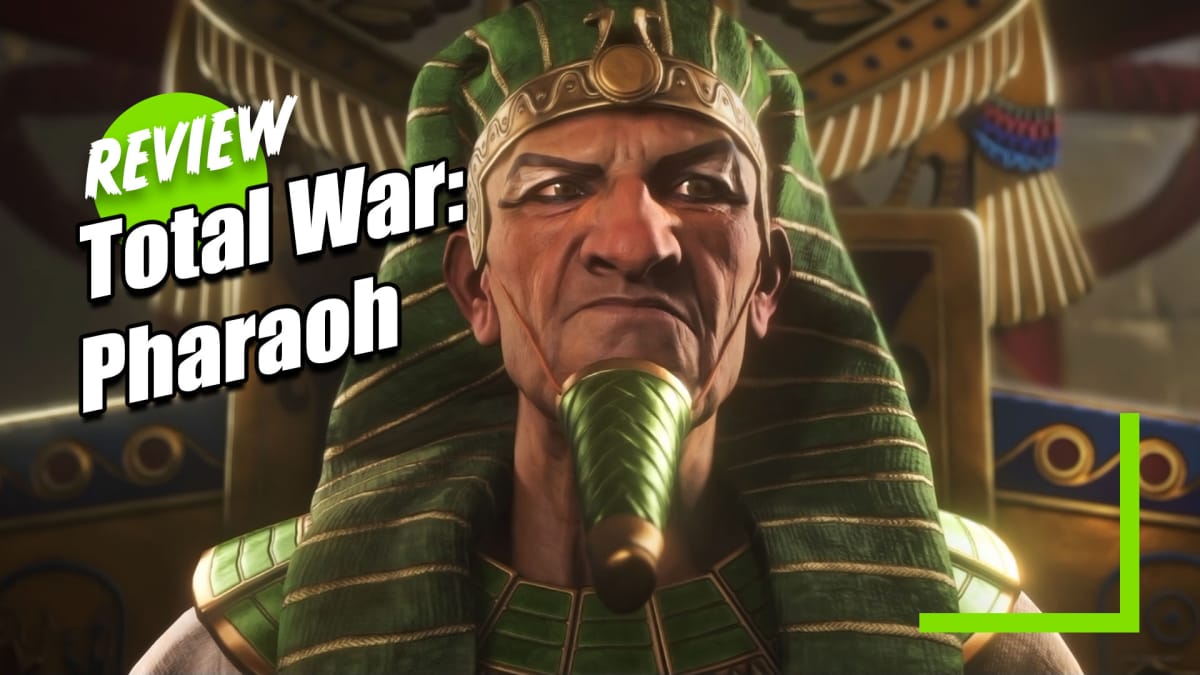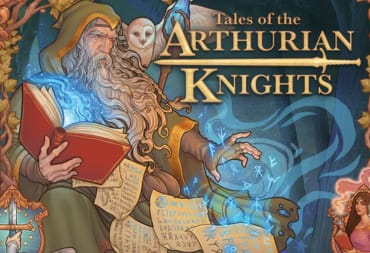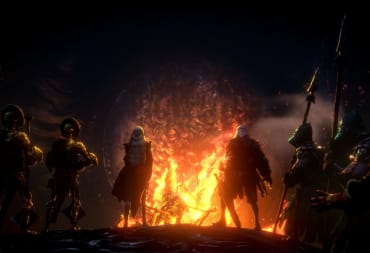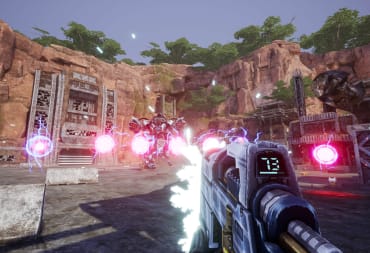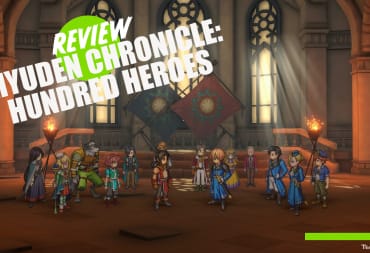When Creative Assembly announced Total War: Pharaoh, many expected it to be the grand return of the big historical Total War games, and sharing that hope, I celebrated.
Historical Total War games have been in a strange place over the past 10 years. Attila was quite good, but it wasn't as satisfying for many due to its very specific setting, not quite Rome anymore and not quite Medieval yet.
Three Kingdoms was also a decent entry in the series, but it was abandoned too quickly and it was in that middle-ground between history and literary myth that didn't fully satisfy many historical Total War fans.
On the other hand, the Total War Saga sub-series with Thrones of Britannia and Troy was very limited in scope, but at least it was sold at more affordable prices to match that.
Yet, they were small morsels, incapable of satisfying the thirst or a new historical Total War game with the massive scope of Medieval, Rome, or Empire.
In the meanwhile, the Total War: Warhammer series has shown that Creative Assembly is absolutely still capable of delivering a campaign of epic scale and scope... but it's fantasy. Don't get me wrong. I don't love it any less. I'm not among the historical fans who see it as "the enemy."
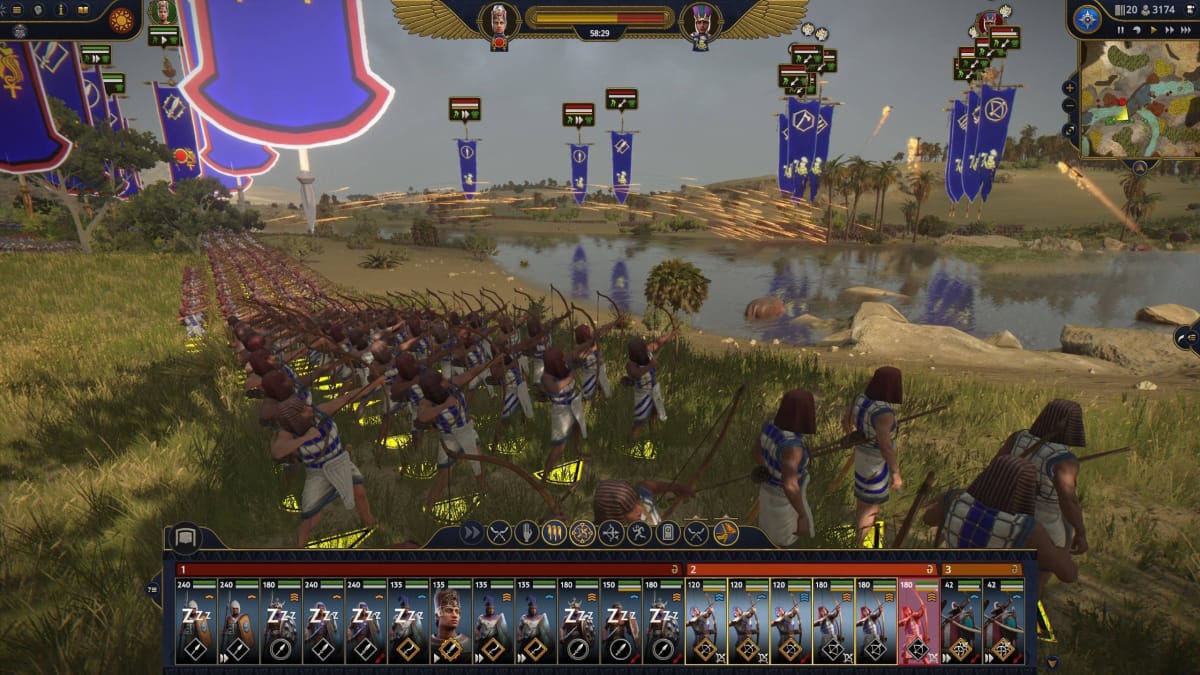
The fact that Sega and Creative Assembly are selling Pharaoh at the full $59.99 price obviously created comparable expectations of a game that wasn't just another TW Saga.
And that's one of the most visible problems here: I'm going to address the elephant in the room right away. Yes. This is another Total War Saga minus the branding, plus the full price. I'm sorry. That's just how it is.
The game is set mostly in Egypt during the Bronze Age Collapse, which is an interesting but rather limiting choice.
While it does create a rather unique and somewhat apocalyptic setting, with society ripping at the seams and large-scale invasions looming over the horizon, it's also not an incarnation of the much more popular and diverse Egypt during its periods of maximum splendor.
The map is rather small and feels boxed in pretty much from all directions. It includes the Levant (part of North Africa, part of the Middle East, and part of Anatolia), but it stops very short of covering the whole region, so much that some of the borders seem to have been drawn arbitrarily to intentionally limit the scope of the campaign.
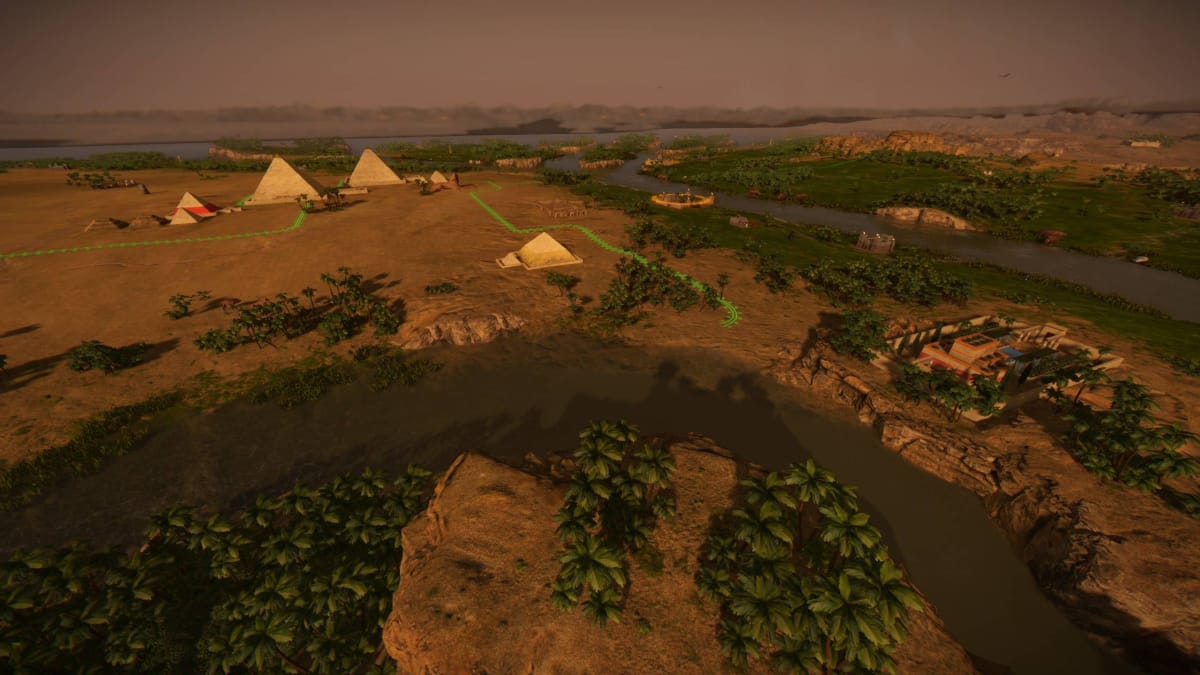
We have only three playable cultures: Egypt, the neighboring Canaan, and the Hittites of Anatolia, yet only Egypt can really be defined as full-fledged and fleshed out. Canaan and Anatolia feel a bit of an afterthought. In fact, we have five Egyptian leaders to play and only two each for the other two cultures, which also feels limited features-wise.
There was a lot of potential to include the whole Levant and even perhaps a bit more, with so many interesting and historically relevant cultures that would have potentially created a game of truly epic scale reminiscent of the most glorious days of the series, but the scope was kept limited, likely intentionally.
The game bears a striking resemblance to Troy not just in scope, but also in a lot of the content. I won't go as far as calling it a "reskinned Troy" as I've seen in some quarters. That would be an unfair exaggeration, but it's obvious that the DNA of the game inspired by Homer's poems is there.
Creative Assembly Sofia did try to add some depth to the campaign in the form of new mechanics. Some are actually quite interesting, like the Workforce mechanic that makes a lot of sense and is one of the few standout innovations that I really appreciated in this game.
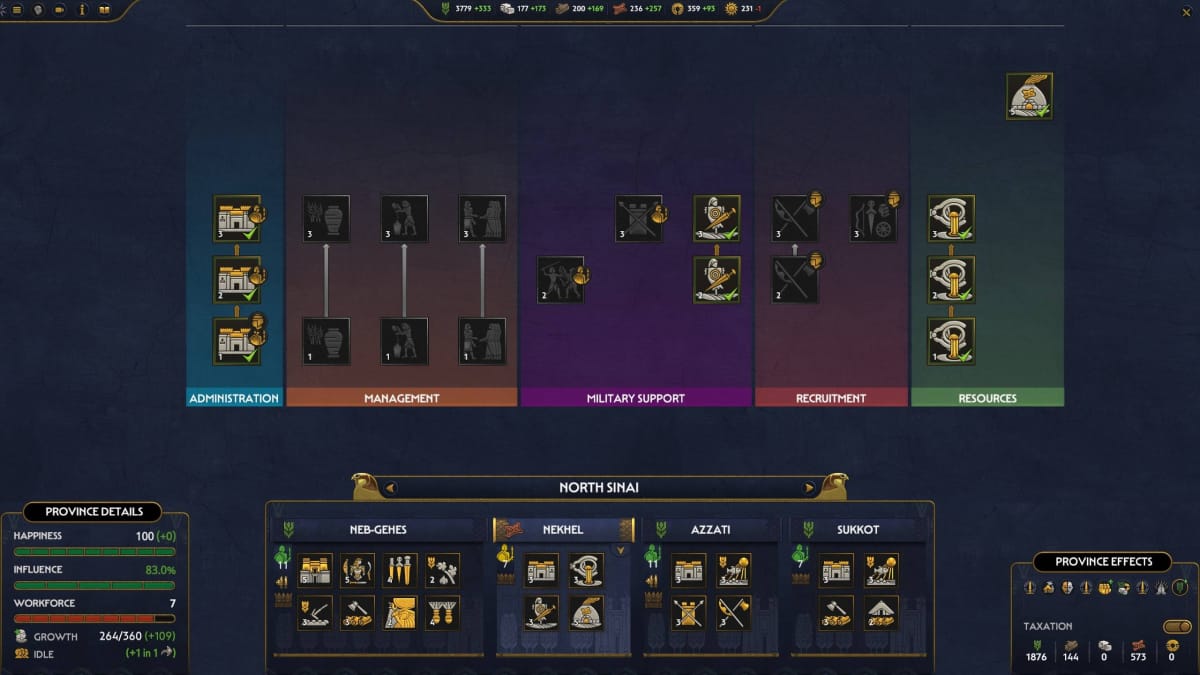
By balancing the workforce used in building with recruitment needs, it compels the player to pay more attention to what feels like a realistic representation of a province's society, and the fact that it influences public order is the cherry on top.
It also makes building progression a more reasoned and natural process than simply "gather X resources and press build." While some may bemoan the loss of intuitiveness, I celebrate it and hope this will be carried on to future games of the series.
On the other hand, I absolutely hated the fact that you can just buy instant construction with gold. I'm sorry Civilization fans, but there's no money in the world that makes bricks and walls magically and instantly appear from thin air.
Combined with the downright crazy abundance of troops that can simply be summoned instantly and ready to fight (including some really powerful types), it flattens the tactical depth of the game and reduces the importance of planning ahead.
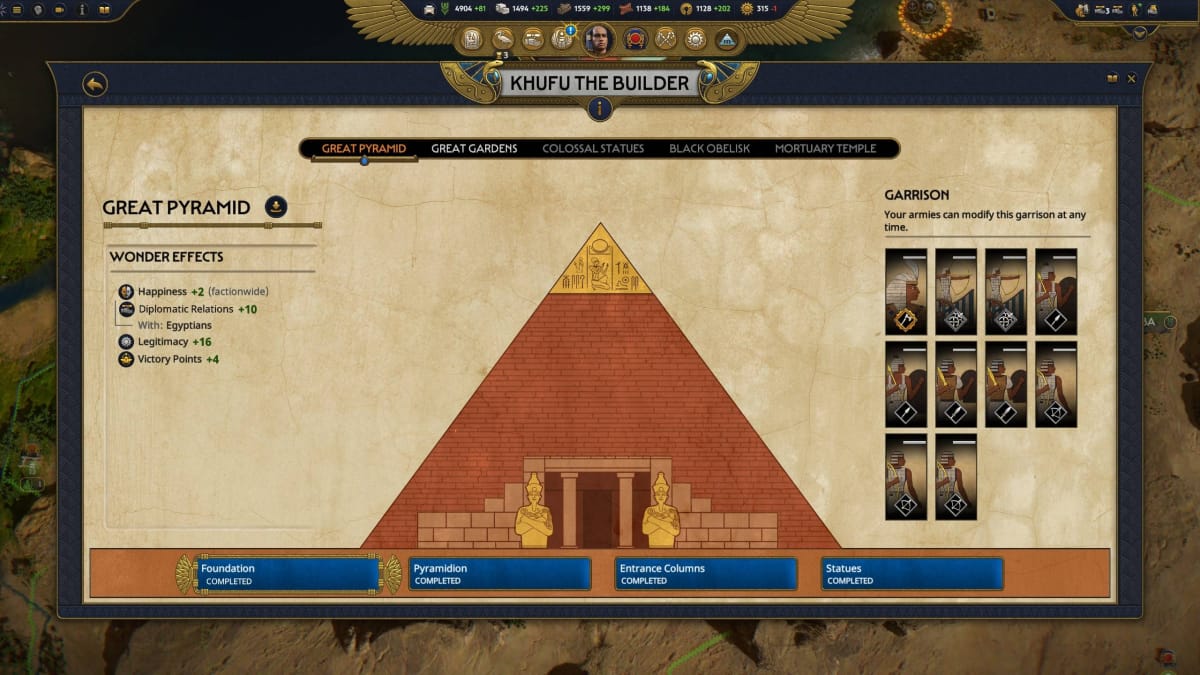
Why bother to defend a fringe region from sudden invasions when you can just make an army magically appear from the sand? What is this, The Mummy Returns? Why worry about a possible deficit of bronze (for example) when you can just turn money into a working furnace like Harry Potter?
I did enjoy the Outpost system. By letting you create different buildings outside your cities, the game does benefit from a further layer of customization and depth for your regions, also influencing the tactical approaches when attacking and defending them.
On the other hand, the fact that you have to choose a specific legacy to be able to build wonders is a design decision that I can only consider misguided, if not plainly obtuse. I suppose it's a limitation to encourage replayability, but the wonders of Egypt are such an important part of its history that locking them out if you pick something else is just illogical.
Yet, if you do pick the legacy that unlocks the building of wonders, you're locked out of colonizing Akhetaten (which is tied to another legacy), which means that you're likely going to end with a big empty hole in the middle of your realm.
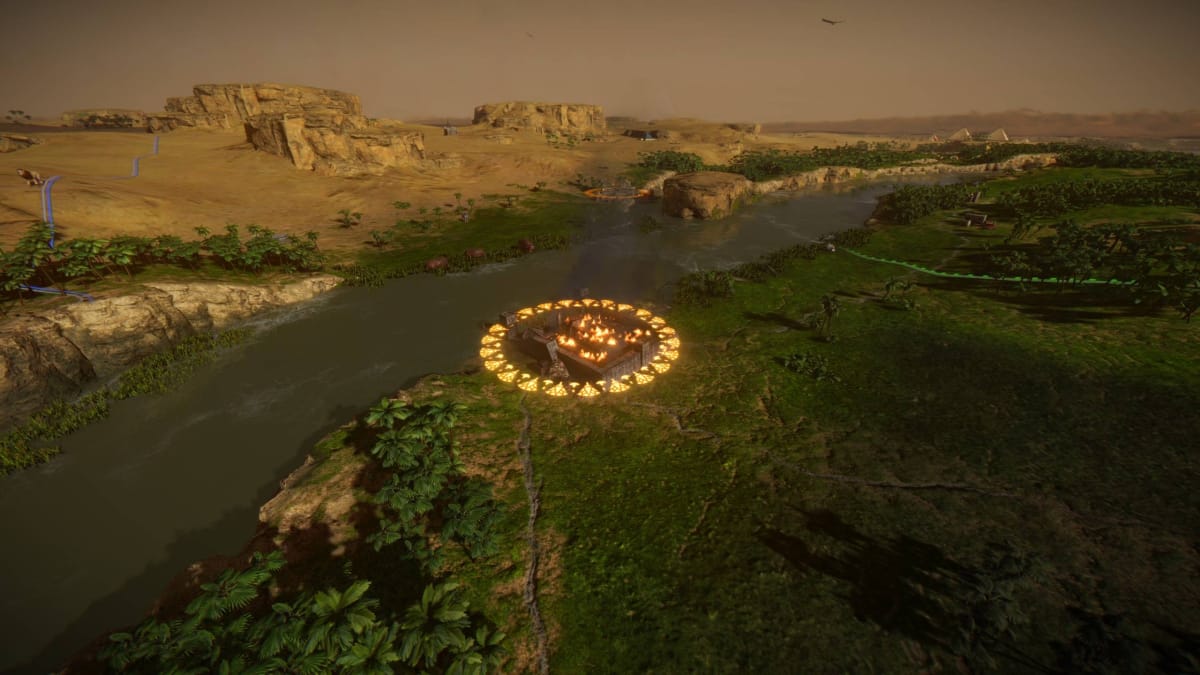
And to add insult to injury, who thought it was a good idea to have wonders take a specific outpost slot so that if by chance you or someone else have built something in there, the construct button for your wonder will be grayed out without an explanation?
Do I really need to clear out that tiny trading post to build a pyramid in the middle of the desert? If you bring back this system, Creative Assembly, by the love of Osiris, please give wonders their own slot.
The way province building is structured in general (excluding outposts) isn't terrible, but it feels extremely scripted. Yes, you do get a bunch of different building options, but most are either useless or much less useful than others. In most cases, you'll end up ignoring a bunch of options and just go the cookie-cutter way, which is normally very obvious.
The court mechanic is also a decent one, especially considering that it's one of the few moments in which you'll have some personal interaction with the other rulers, albeit it's limited to a few soundbites as they appreciate your actions or not. That being said, it feels a bit gamey, and ultimately it's reduced to pressing the same buttons every turn.
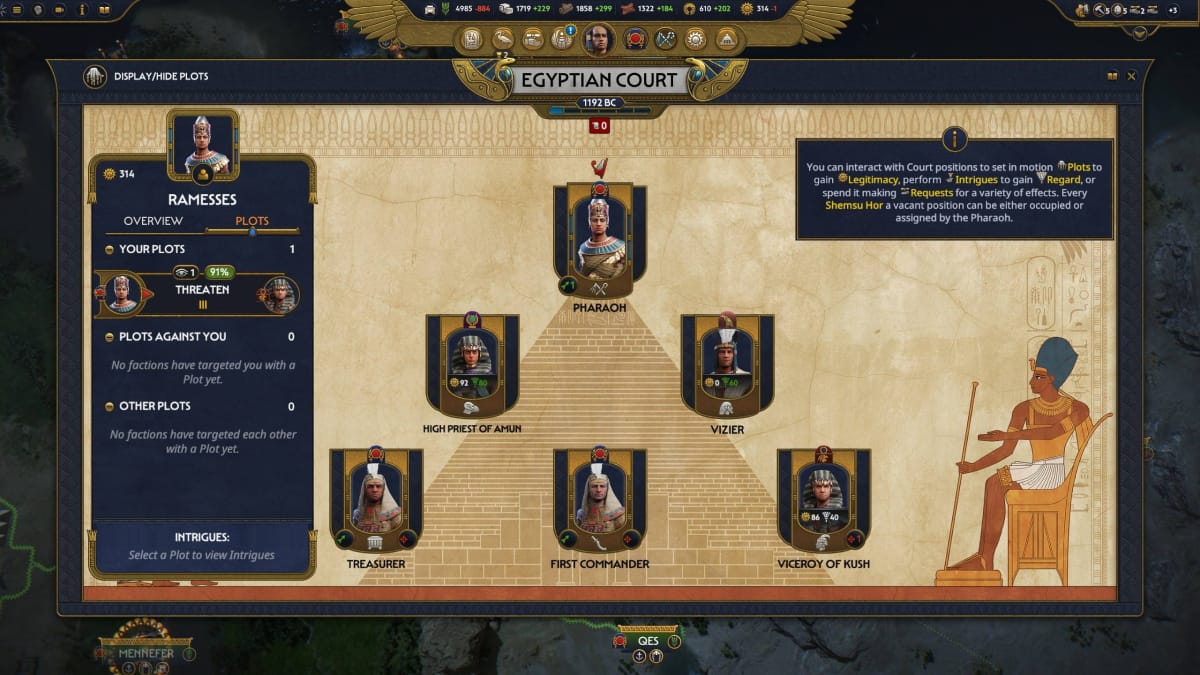
Diplomacy continues to be the Achilles' Heel (yes, I know. This is not Troy... or is it?) of the series. Obvious options continue to be missing. You can try to persuade another ruler to join a war, but not to make peace with someone, and that's just weird.
On the other hand, the silver lining is that the Ultimatum option is, for once, practical and useful. It has been a source of incredible frustration for me in previous games of the series. It especially comes in clutch to persuade recalcitrant leaders to confederate, and the reliability penalty goes away quickly enough.
Speaking of relationships, there's one thing that left a really sore impression. With how limited the campaign is, there was likely plenty of room to make it a little bit more narratively driven, especially with the fact that playable factions are represented by named characters that are often related.
Yet, there's very little narrative interaction between them. As Ramesses, you can ally with Tausret and then slaughter her husband Seti, and she won't bat a khol-lined eye without mentioning that the bastard has treated you like a weak little brother for the whole campaign, but putting him out of his misery isn't acknowledged by the game in any way.
This is certainly a big missed opportunity. I swear the pre-match banter between fighters in Mortal Kombat has more depth than the whole sum of the character interactions in Total War: Pharaoh.
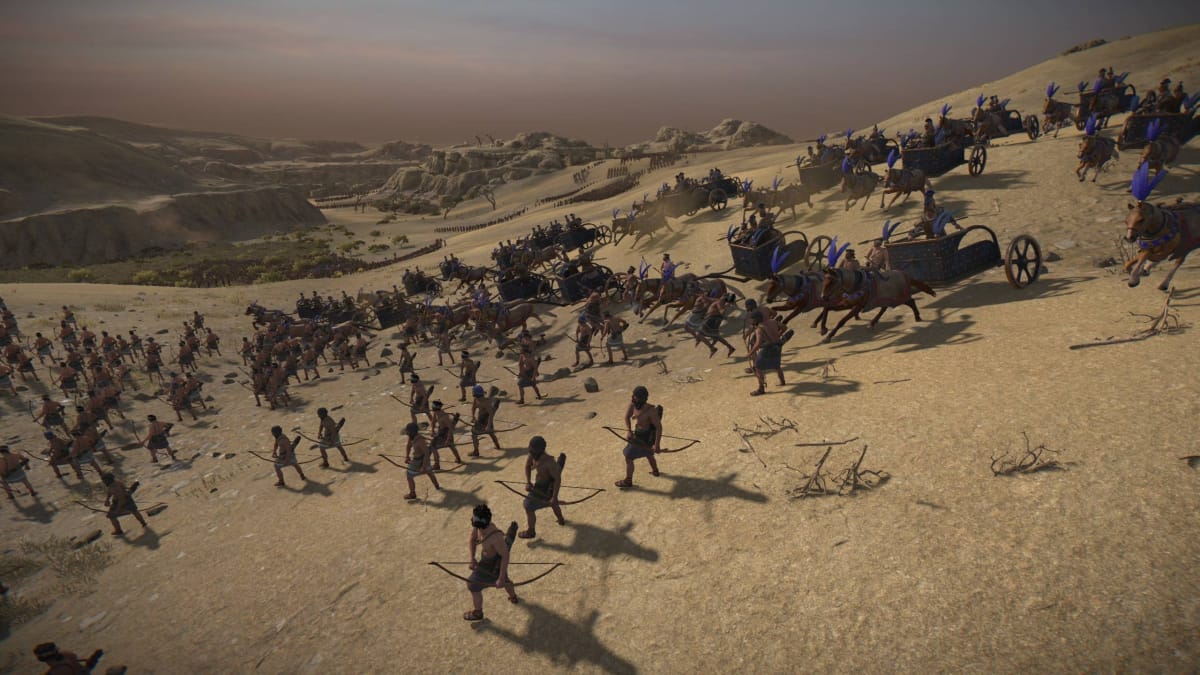
Field battles are pretty good, but they're honestly more of the same. I welcome the occasional change in weather, the different troop stances, and the synced animations between fighters, but the lack of diversity in the available roster of troops is a big downer.
Yes. There are many cultural versions of the same troop type, but in the end, all the archers are still archers with different clothes and stats, and the same goes for every troop type. There are no siege engines and no cavalry besides chariots, and that reduces the variety and the tactical options massively.
And yes. I am aware that's due to the period and location of the campaign, but that's exactly the point. These choices at the base of the game absolutely feel more like a limiting factor than anything else.
I've been a Total War fan since the first Shogun, and Pharaoh is the game of the series in which I've just autoresolved the most battles. As a matter of fact, I'd have done it even more if I hadn't had to review the game, which obviously involves playing all of its aspects. This is depressing.
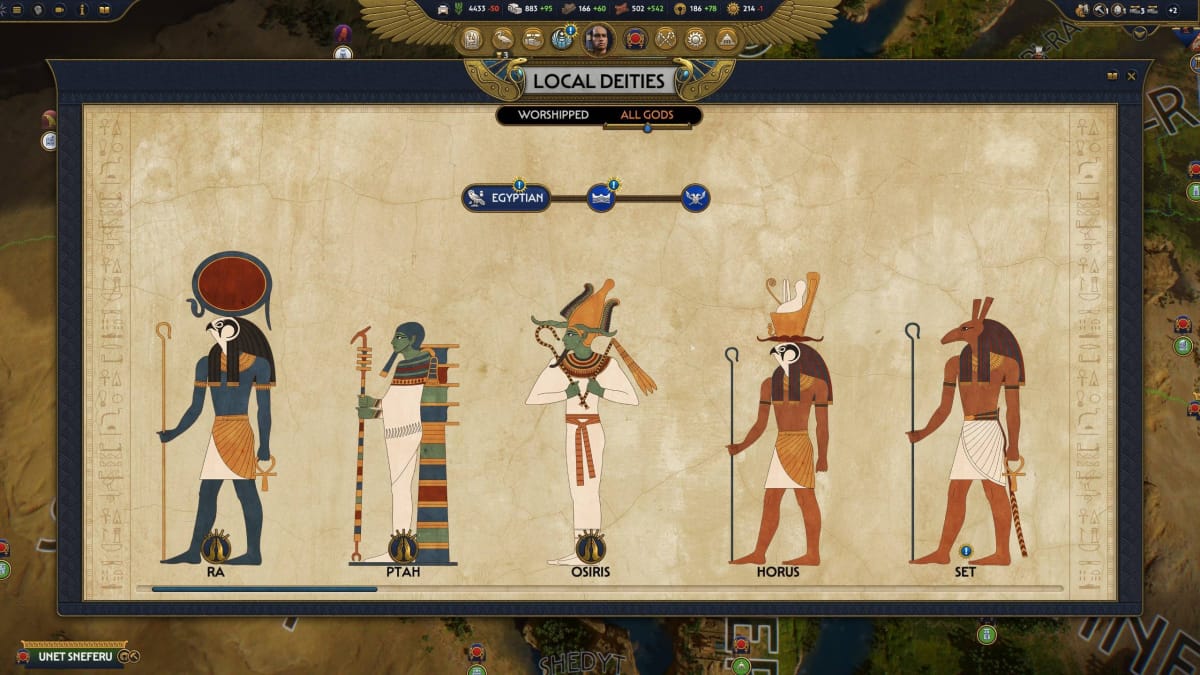
The lack of any form of naval warfare also feels like just another missing opportunity for a game that has one of its central themes in the invasion of the "sea people." I absolutely loved them in past Total War games and their omission in modern ones always feels bad.
While the thematic mechanics of the Bronze Age Collapse add some welcome flavor, they ultimately feel more cosmetic than anything else. I found them rather easy to deal with, and besides the change in color palette (which I loved), it didn't feel all that apocalyptic.
The dreaded Sea People themselves weren't all that challenging, and they suffered from lack of any personality or flavor. They should have felt like a last boss, both mechanically and story-wise, but they're little more than an occasional annoyance.
I've left the production values for last since they're simply nothing to call home about.
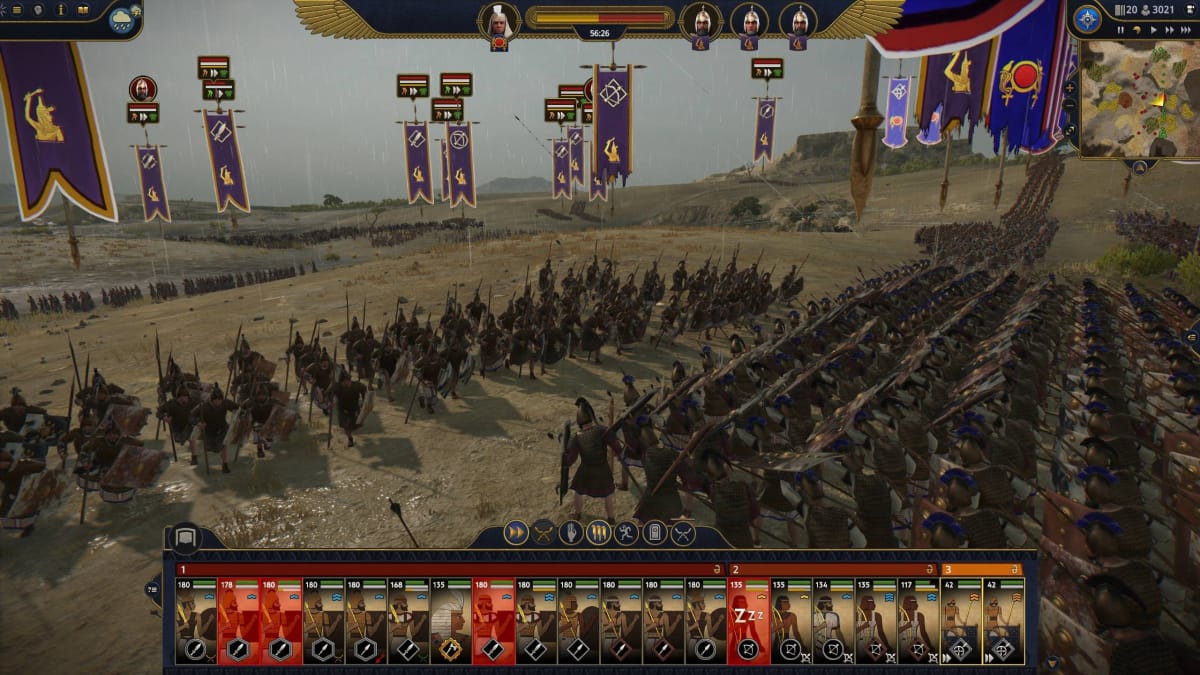
A few bells and whistles have been added, but it's obvious that the engine that was once revolutionary is now obsolete. Pharaoh falls short on the eye-candy scale in 2023 and the most positive thing I can say about the visuals is that they were easy on my system.
The lack of variety among troop types also plays a role here, since it does severely hamper the visual spectacle of the battles, while I did enjoy the look of the campaign map quite a bit. That's always particularly inspired in the series' games, and this one isn't an exception.
The stylish UI is also a high point, with both its design and its art thematically fitting the Egyptian setting perfectly. I especially appreciated the ability to change the unit cards from a 3D representation into a 2D drawing similar to what you'd expect on the walls of an ancient temple, but this should have honestly been the default.
The audio is decent but not particularly inspired, with many sound effects that feel recycled from past games and music that is nice but not exactly memorable.
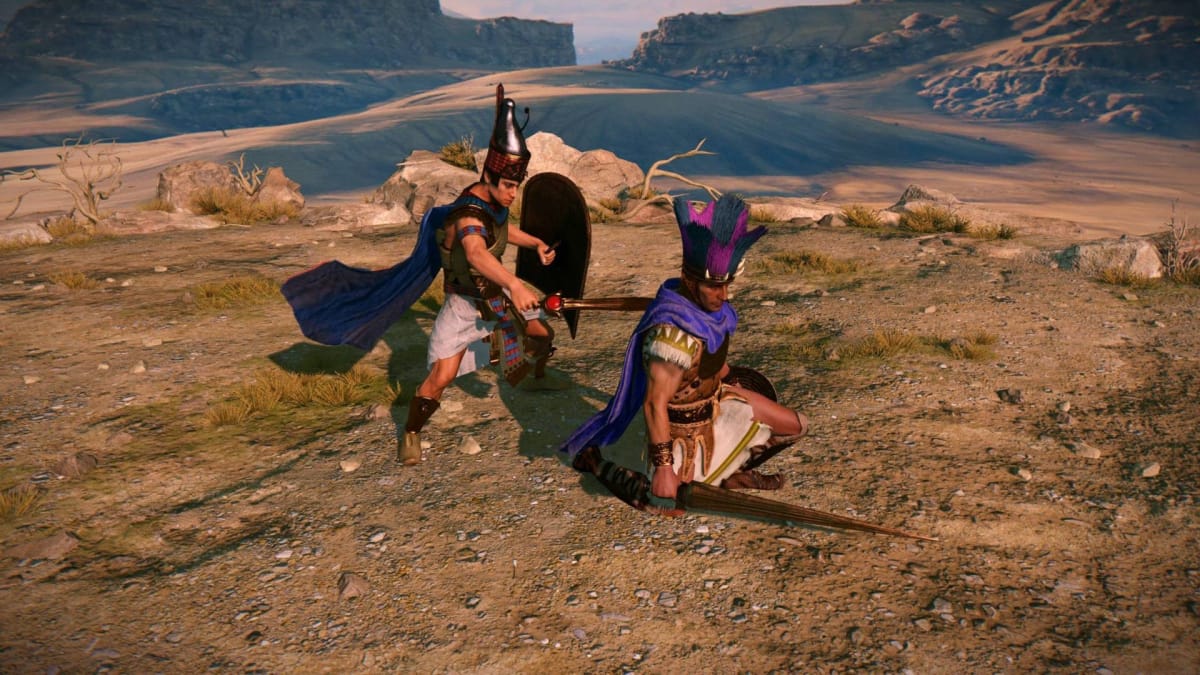
Ultimately, if you look at Total War: Pharaoh on its own, completely disregarding the legacy of the series and everything else that's on the market, it's not a terrible game. It's enjoyable for a couple of campaigns, and it brings to the table a couple of welcome innovations.
On the other hand, it's absolutely not the grand return to the heyday of historical Total War games that the marketing and the price would have suggested. It's a wargame that feels limited and tightly - too tightly - contained.
If that's what you enjoy, then this may be a good option, but it's certainly no Medieval, Rome, Empire, or even Shogun or Napoleon.
It could perhaps become more interesting and diverse with the injection of a few large DLCs, or a big expansion like Fall of the Samurai shifting the setting into a period permitting more variety and a larger scope. Yet, as it is, Pharaoh falls very short of the legacy of the series and will likely disappoint many as it disappointed me.
Total War: Pharaoh was reviewed on PC with a copy provided by the publisher over the course of 59 hours of gameplay. All screenshots were taken during the process of review.
Review Summary
Pros
- If you like contained, short campaign, this may be the Total War game for you
- The UI is really stylish and fitting to the setting
- A few new mechanics feel like the seed of something good
- The campaign map looks very nice
Cons
- The roster of units suffers from extreme lack of variety
- The engine is obsolete
- You have basically only one culture and two halves playable
- The map is way too small, with borders that feel arbitrary
- Diplomacy still feels limiting
Have a tip, or want to point out something we missed? Leave a Comment or e-mail us at tips@techraptor.net
